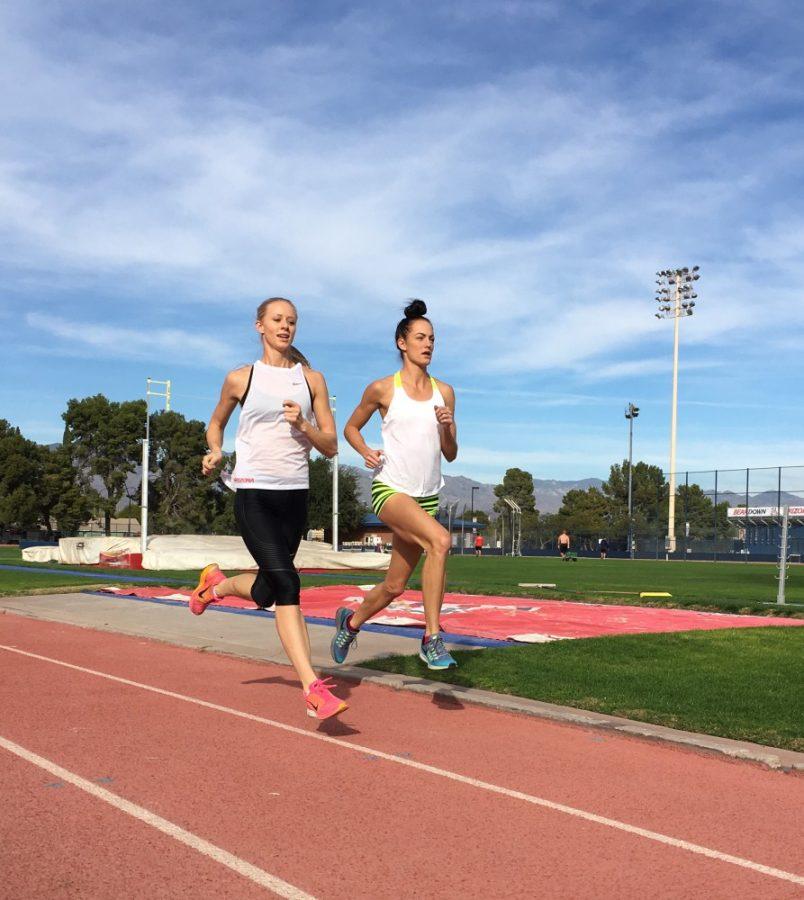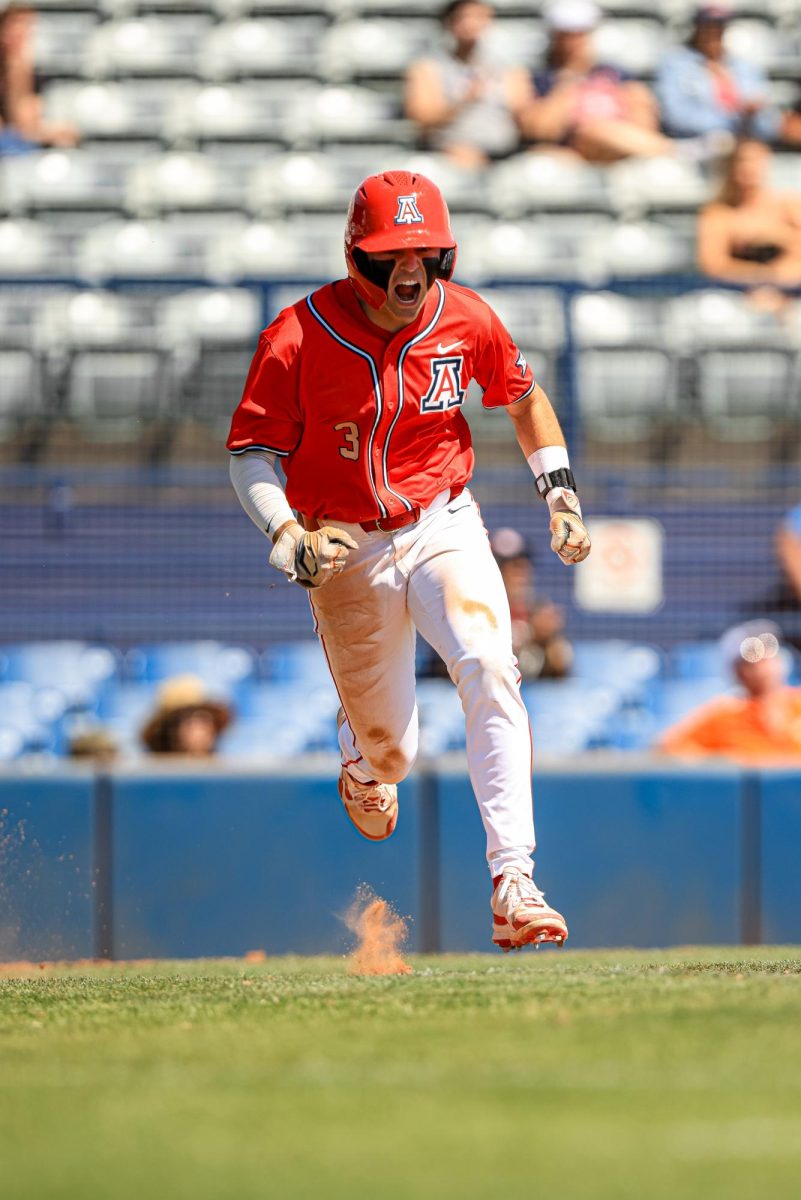Former Arizona track and field athlete Georganne Moline has a glowing smile and passionate voice as she recalls her journey to the 2012 Olympic Games. The 5-foot-10 Arizona native runs the 400-meter hurdle race. She has spent the last five years ranked in the top 10 in the world, but being at the top hasn’t come without challenges.
Athletes devote years of their lives to make the Olympics, and the thrill of the two-week-long games is an environment where athletes can thrive.
But what happens to these athletes after the games are over and the cameras are gone? Moline experienced the emotional aftermath from the games over the next several years.
“2013 was one of the worst years ever,” Moline said. “I will never forget it.”
Moline is a University of Arizona alumna who lives and trains in Tucson. She is sponsored by Nike and has represented Team USA at the Olympics and IAAF World Indoor Championships.
Her breakout season happened when she was just a junior at the UA in 2012. She made the USA Olympic team and was the youngest competitor in the 400-meter hurdles at the 2012 Olympics.
“At the games, I felt so relaxed. I felt like I had no pressure,” Moline said. “No one expected me to do anything.”
Related: Moline hurdles over mental blocks
She ran a personal record of 53.9 seconds in the Olympic finals and placed fifth. For Moline, she said it was the greatest feeling because she knew she was able to represent her country and state, while making everyone proud. Moline returned to Arizona to finish up her senior year.
During her 2013 season at Arizona, Moline received a lot of attention for her accomplishments from the past season.
That’s when Moline began to sense her emotional let-down was affecting her performance. She was always announced as “Georganne Moline, the Olympian.”
“If I got beat, it was like, ‘Oh, an Olympian gets beat.’ It would be in articles and stuff,” Moline said. “I started to think, ‘Am I not allowed to get beat?’”
That track season, Moline faced her biggest challenge yet. Her rival, Stanford’s Kori Carter, beat Moline in every race. On the starting line, Moline felt she had already lost to Carter. At the NCAA Championships in 2013, both Moline and her rival broke the national record, but Moline placed second. Moline admitted that her mental barriers were more pronounced and she became scared to race because her confidence had disappeared.
“At that point, I had reached an all-time low. I didn’t know how to get myself out of it,” Moline said. “Even my friends and family couldn’t talk me out of it.”
She thought she needed professional help and began to see a sports psychologist, but only briefly. It took years of training for Moline to find her love for track again. She thought athletics wasn’t for her and that maybe she was meant to do something else, but the root of her psychological problem stemmed from how she viewed herself.
“I associated Georganne Moline the person and Georganne Moline the athlete for years,” Moline said.

It wasn’t until late 2016 that she separated the two identities. This change gave her a new appreciation for track and the pressure was lifted. Moline’s running improved and she set a new personal record in 2017 that took four years to reach.
A key figure that guided Moline back to the right path was sports psychologist Dr. Amy Athey. Athey was a different sports psychologist than the one she saw after the Olympics, but helped Moline turn a corner.
Moline said she finally began to understand that there are bigger things in life that just winning and losing a race.
“Quitting was never an option,” Moline said.
Athey currently works for the UA’s athletic department and has been a psychologist for over 15 years. She connects with and helps many other athletes who go through similar emotional struggles to what Moline experienced. According to Athey, there is a feeling of loss when the Olympics end.
“Even if it’s expected, it brings on symptoms of grief because you’re reprocessing that loss,” Athey said. “For some, there may have been disappointment around their performance that they’re coping with.”
Back on the track now, Moline runs side-by-side with teammate Sage Watson. Watson, a former UA track star, represented Canada at the 2016 Summer Olympics in the 400-meter hurdles.
The two sprinters are in sync. They have similar builds with tall, thin bodies. Moline has dark hair while Watson’s long, blonde ponytail trails behind. Both women have the same sponsors, same coach and both experienced discouragement after the Olympics.
Watson described her Olympic experience as “emotionally exhausting.” She felt a lot of pressure from the media because the attention she received on social media was overwhelming.
Watson placed at No. 11 in the 400-meter hurdles and contributed to Team Canada’s fourth-place finish in the relay at the Summer Games in Rio de Janeiro. For Watson, finishing one spot away from the podium at the Olympics was tough to swallow.
Related: No hurdles in Watson’s way
“It took me a while to get over the Olympics. I was a little heartbroken coming up short in my relays,” Watson said. “I took a few weeks off social media and spent time with my family and friends to recover.”
Now refocused on the 2018 season, Watson will use her past experiences to compete on the international stage once again. Watson recently competed at the 2018 Commonwealth Games in Gold Coast, Australia, where she placed fifth.
Both Moline and Watson are proof that an athlete’s Olympic experience can be an emotional roller coaster and each person deals with it differently. Even when faced with emotional and mental hurdles, Moline and Watson have shown the ability to overcome them.
“By going through those emotions, you learn to cope,” Athey said. “People come out of it.”
— Editor’s note: Reporter Teagan Rasche is currently a thrower for the Arizona track & field team.
Follow Teagan Rasche on Twitter









